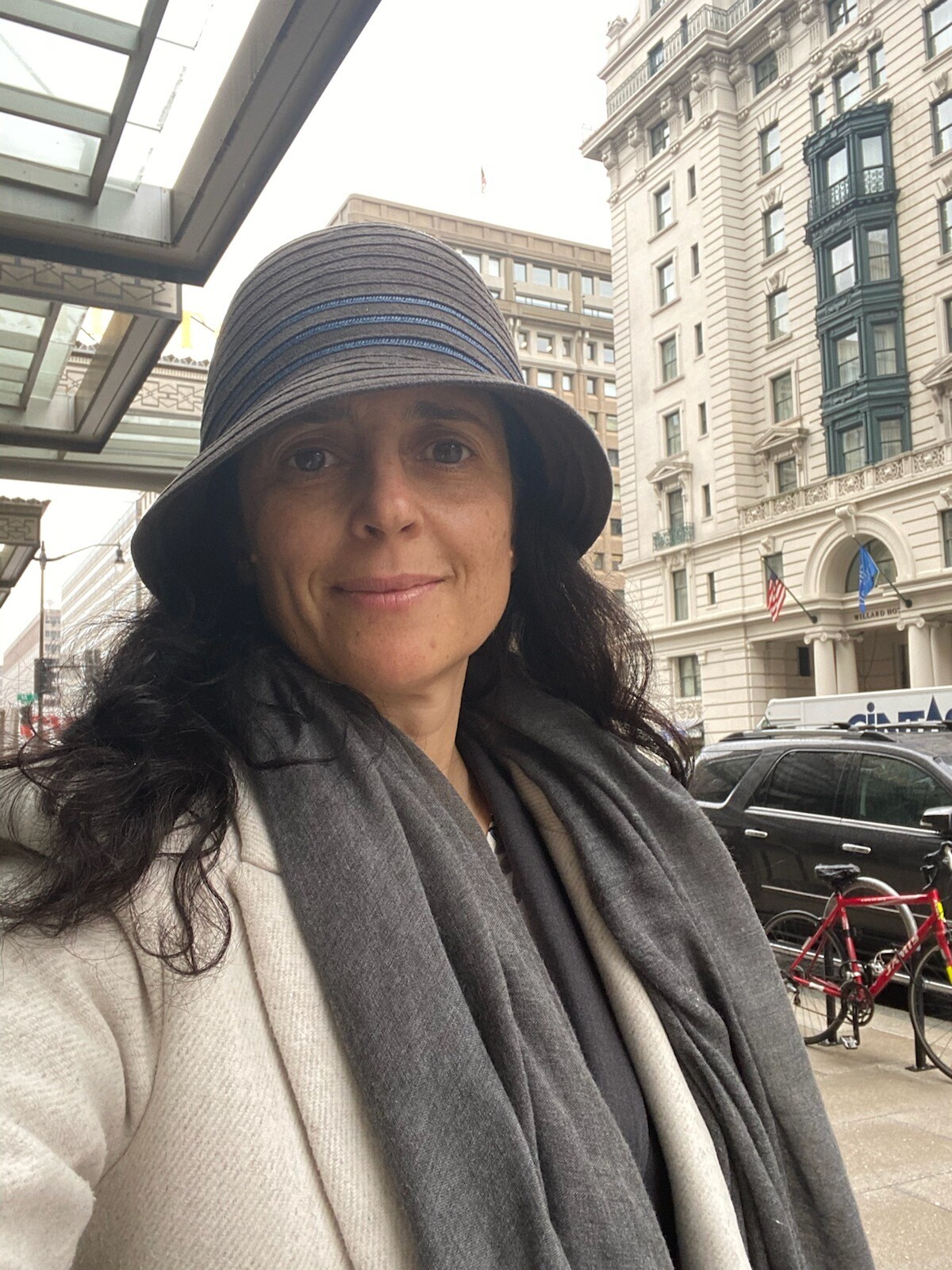To commemorate International Women’s Day (IWD), during Women's History Month, we asked scientists across a variety of Amazon research areas about their backgrounds, and the most exciting innovations in their fields. Here’s what they had to say.
Xin Luna Dong, principal scientist

Dong is a principal scientist, leading the efforts to develop the Amazon Product Knowledge Graph. Dong received her PhD in computer science, with a focus on data integration, from the University of Washington. The personal information management system in Dong’s dissertation (which won the Best Demo award in Sigmod’ 2005), is a personal knowledge graph developed at least five years before the phrase “knowledge graph” was coined. After graduation, Dong led the development of the Knowledge-based Trust project at Google. Dong has co-authored the book Big Data Integration. She is an ACM Distinguished Member, and has received the VLDB Early Career Research Contribution Award for "advancing the state of the art of knowledge fusion”. Dong was program committee co-chair for Sigmoid 2018, and is program committee co-chair for VLDB 2020. She also serves on the VLDB endowment and PVLDB advisory committees.
Innovations I find exciting
A recent innovation that I’m most excited about is graph neural network (GNN). Unlike recurrent neural networks (RNNs) and convolutional neural networks (CNNs), which focus much more on regular data such as word sequences, 2-D images, and 3-D videos, GNNs allow us to leverage graphs to capture much more complex relationships. These include elements in the graph, represented by nodes in the graph, and their relationships, represented by edges between the nodes. Examples of graphs influenced by GNNs include social networks, world wide web (WWW) topology, knowledge graphs, and molecular graphs. As we build knowledge graphs for products, it is amazing how many different ways we can benefit from GNNs.
Naturally, we can apply GNNs on the knowledge graphs we have built, to discern interesting patterns to find popular artists in the music domain. We also model webpage layouts as graphs, and model customer behaviors as graphs, so GNNs help us extract relevant knowledge and enrich our knowledge graphs. This new technique enables us to be so much more creative in the practice of constructing knowledge graphs, and applying the findings to real-world applications.
Claire Law, senior technical program manager

Law is senior technical program manager on Amazon’s physical retail team, the team behind the Just Walk Out technology used in Amazon Go and Amazon Go Grocery stores. She studied nanotechnology engineering at the University of Waterloo. Early on, she realized that she didn’t enjoy the type of lab work expected from a researcher in material science. She leveraged a university program, and interned as a software developer, marketer, hardware test engineer, project control officer in consulting, and software program manager. These experiences, coupled with work experiences at Microsoft and Research in Motion, led Law to pursue a career in software.
After a stint in Amazon’s international organization, Law joined the physical retail team to work on machine vision initiatives. On this team, Law is able to leverage her experience in cloud computing and knowledge of optics and photography to build new experiences for physical retail.
Innovations I find exciting
We are only now reaching a level where computer vision can solve real-world problems in a meaningful way. While we still need to be creative in where we look for simplifiers, algorithms are able to solve more and more problems every day. Challenges that looked insurmountable just a couple years ago are now part of production systems across the industry. Checkout-free stores seemed like science fiction before Amazon Go was launched, and now customers are loving this effortless shopping experience in the 25 Amazon Go stores, and the new Amazon Go Grocery store we have open today.
Yoelle Maarek, vice president

Maarek is vice president of research and science, Alexa Shopping. Prior to Amazon, Maarek served in engineering and research leadership roles at Yahoo, Google and IBM. Maarek has been regularly serving as program committee (PC) chair and senior PC committee member at leading academic research conferences related to Web search and data mining, such as SIGIR, The Web Conference, and Web Search and Data Mining (WSDM). She is currently serving on the steering committees of WSDM and the Web Conference series.
She is a member of the Technion Board of Governors and was inducted as an ACM Fellow in 2013. Maarek obtained a PhD in computer science from the Technion, Israel in 1989. She holds an engineering degree from the Ecole des Ponts et Chaussées, and a DEA (graduate degree) in computer science from Paris VI university. Maarek completed her PhD at the Technion in Israel and was a visiting student at Columbia University. She played a pioneering role within industry in researching the field of information retrieval, the computer science discipline behind search, in the pre-Web era, and led the launch of Google Suggest, the query auto-completion capability. As such, she jokingly refers to herself as a “search dinosaur”.
Innovations I find exciting
We are on the verge of making ambient computing happen, and Alexa is pioneering this long-awaited revolution. It forces us to revisit all our assumptions across multiple domains. I see this prevalent especially in search and question answering. These are topics close to my heart. I have been following progress in these areas since I got my PhD thirty years ago. The focus on ambient computing is also a unique opportunity for us at Amazon to demonstrate what we mean by customer-obsessed science. As humans are learning to interact with machines, their behavior is evolving and we need to follow suit. It not only challenges scientists to keep inventing on behalf of customers but also forces all of us to remain humble. We are not here to teach customers how to speak to a machine, but rather to do everything in our power to understand, satisfy and predict their needs so as to constantly wow and delight them.
Angeliki Metallinou, applied science manager

Metallinou is an applied science manager within the Amazon Alexa AI Natural Understanding group. She received both her PhD, and master’s degree in electrical engineering from the University of Southern California. Her interests and experience lie in the areas of spoken and natural language understanding, dialogue systems, machine learning, deep learning, affective computing and applications for education and healthcare.
She has published papers in the areas of speech, language, dialogue, artificial intelligence and multimodal human computer interaction at leading science conferences such as Interspeech, the AAAI Conference on Artificial Intelligence, and the Association for Computational Linguistics (ACL), has served as an area chair for Interspeech 2016, and as a reviewer of papers for several science conferences.
Innovations I find exciting
It is exciting to see how new techniques in deep learning continuously push the boundaries of the state of the art in the fields of dialogue and spoken language processing. I’m very interested in advances around unsupervised, semi-supervised and transfer learning, which allow deep learning models to leverage the power of large corpora without relying on costly and time-consuming manual annotations. Pre-trained language models like BERT and GPT-2 and their use in downstream applications are just a few examples. These innovations are particularly relevant for industry applications where scalability is key.
I am also excited about recent literature in deep learning that is allowing us to develop models to perform complex tasks like higher-level reasoning, for example, over the contents of a document or an image or both, as opposed to simpler classification tasks. I’m also excited to see how these methods can have a positive impact on people through their deployment in products, especially in applications of healthcare, accessibility and education.
Priya Ponnapalli, principal deep learning scientist

Ponnapalli is a senior manager and principal deep learning scientist within the Amazon ML Solutions Lab, where she leads a global team of data scientists that help AWS customers accelerate their adoption of ML and cloud technologies across industries, from healthcare and finance to sports. As the leader of Amazon ML Solutions Lab’s sports business, Ponnapalli works with customers including National Football League (NFL), Six Nations Rugby, and Formula 1 (F1), just to name a few, to enhance the fan experience and transform sports using ML.
Ponnapalli is also a senior research affiliate at the Genomic Signal Processing Lab at the University of Utah, and a faculty member at Rutgers Business School, where she teaches ML to business leaders, and works to inspire the next generation of leaders. Prior to joining AWS, she co-founded Eigengene, a data-driven personalized medicine startup and has helped companies like Genentech and Roche establish and build data science teams. For her PhD in electrical and computer engineering at the University of Texas at Austin, Ponnapalli defined and demonstrated the higher-order generalized singular value decomposition (HO GSVD), the only framework that can create a single coherent model from multiple two-dimensional datasets by extending the GSVD from two to more than two matrices.
Innovations I find exciting
As an Amazon ML Solutions Lab scientist, I’m most excited about real-world applications of ML across industries. I’m interested in innovations to overcome challenges with small, limited datasets that companies often have to contend with. I’m also intrigued by model interpretability and explainability which are key to earning trust and spurring broad adoption. I’m passionate about making ML accessible to all, so it can be used to solve some of the most important problems we are facing, from fighting climate change to treating cancer.
Ana Pinheiro Privette, senior program manager

Ana Pinheiro Privette is a senior program manager with Amazon's Sustainability group. She joined the Sustainability Science and Innovation team in September 2017 as the program lead for the Amazon Sustainability Data Initiative (ASDI), a program that seeks to leverage Amazon’s scale, technology, and infrastructure to help create more global innovation for sustainability. ASDI is a Tech-for-Good project and is a joint effort between Amazon Sustainability and the AWS Open Data team focusing on democratizing access to key data and analytical capabilities to anyone working in the sustainability space.
Privette was trained as an environmental engineer and as an earth sciences researcher at the New University of Lisbon (Portugal) and at MIT. She did her doctoral research work at NASA in the Washington D.C. area and as part of her project, she spent a couple of years running scientific field work sites in Africa to support a NASA international field campaign. After spending most of her career at NASA and NOAA as a scientist, Privette led projects for the White House climate portfolio, including the Obama Climate Data Initiative and the Partnership for Resilience and Preparedness (PREP), both focused on delivering better access and use of US Federal climate data to support decision makers.
Innovations I find exciting
As part of ASDI, I work very closely with AWS customers developing applications in the space of sustainability to understand what challenges they may be experiencing and how we may accelerate sustainability research and innovation by minimizing the cost and time required to acquire and analyze large sustainability datasets. The ASDI currently works with scientific organizations like NOAA, NASA, the UK Met Office and Government of Queensland to identify, host, and deploy key datasets on the AWS Cloud, including weather observations, weather forecasts, climate projection data, satellite imagery, hydrological data, air quality data, and ocean forecast data. These datasets are publicly available to anyone.
In addition, ASDI provides cloud grants to those interested in exploring the use of AWS’ technology and scalable infrastructure to solve big, long-term sustainability challenges with this data. The dual-pronged approach allows sustainability researchers to analyze massive amounts of data in mere minutes, regardless of where they are in the world or how much local storage space or computing capacity they can access.
Nashlie Sephus, manager, applied science

Sephus is an applied scientist on AWS’s artificial intelligence team, focusing on computer vision. In this role, Sephus focuses on the fairness and accuracy of the team’s algorithms. Sephus formerly led the Amazon Visual Search team in Atlanta, which launched visual search for replacement parts on the Amazon Shopping app in June 2018. This technology was a result of former startup Partpic (Atlanta) being acquired by Amazon, for which she was the chief technology officer (CTO). Prior to working at Partpic, she received her PhD in 2014 from the School of Electrical and Computer Engineering at the Georgia Institute of Technology. She received her bachelor’s degree in computer engineering in 2007 from Mississippi State University.
Innovations I find exciting
Since the onset of machine learning and artificial intelligence, neural networks (such as convolutional neural networks (CNNs), and generative adversarial networks (GANs), etc.) and learning algorithms have always excited me. It’s being able to quickly and automatically draw patterns from data, whether it be images, video, or audio at scale, that fascinates me. Since music was my first love (along with karaoke!), music information retrieval has always been a passion of mine. These innovations, when used responsibly and fairly, are able to benefit people in their everyday activities.


















